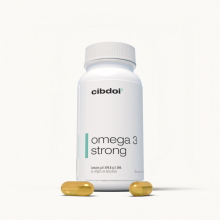Does Omega-3 Help the Immune System?
Published:
Omega-3 fatty acids provide well-established heart health benefits, but emerging research also indicates they support optimal immune function. This article explores the science on omega-3s and immunity and provides tips on optimizing your intake.
Contents:
- What Are Omega-3 Fatty Acids?
- How Omega-3s Support Immune Health
- Top 5 Dietary Sources of Immune-Boosting Omega-3s
- Omega-6:Omega-3 Ratio Also Matters
- Lifestyle Tips to Maximize Omega-3 Immune Benefits
- Supplement Form Impacts Immune Benefits
- Safety and Side Effects of High Omega-3 Doses
- Key Takeaways: Omega-3s and Immunity
What Are Omega-3 Fatty Acids?
Omega-3 fatty acids are a class of polyunsaturated fats renowned for their anti-inflammatory properties.
The main biologically active omega-3s involved in human physiology are:
- Eicosapentaenoic acid (EPA)
- Docosahexaenoic acid (DHA)
- Alpha-linolenic acid (ALA)
EPA and DHA primarily come from seafood, while ALA is found in plant sources like walnuts and flaxseeds. Your body can convert a small portion of ALA into EPA and DHA.

Omega-3s help regulate inflammation and immune cell activity. Consuming enough of these fats appears crucial for a properly functioning immune system.
How Omega-3s Support Immune Health
Research shows omega-3 fatty acids influence immunity in several key ways:
1. Regulate Inflammation
Omega-3s help control immune cell signaling molecules called eicosanoids that drive inflammation. This protects against an overactive immune response.
2. Support Immune Cell Function
Omega-3s are incorporated into immune cell membranes, supporting optimal structure and cell signaling. This enhances immune defenses.
3. Maintain Lymphocyte counts
Omega-3s help maintain healthy levels of lymphocytes like T cells and B cells that are essential for immune responses.
4. Reduce Autoimmunity Risk
Omega-3s may suppress autoimmune reactions in conditions like lupus, multiple sclerosis, and rheumatoid arthritis.
5. Improve Allergy Symptoms
Omega-3 intake is linked to reduced allergy symptoms. EPA and DHA may inhibit release of compounds that trigger allergies.
Through a variety of mechanisms, getting enough omega-3 fatty acids promotes a properly balanced, defensive immune response without excessive inflammation.
Top 5 Dietary Sources of Immune-Boosting Omega-3s
You can obtain omega-3s from both marine and plant food sources. Here are 5 of the top dietary sources:
1. Oily Fish
Fatty fish varieties like salmon, mackerel, tuna, herring and sardines are highest in anti-inflammatory EPA and DHA omega-3s.
2. Fish Oil Supplements
Fish oil capsules contain concentrated amounts of EPA and DHA. Algae-based supplements are suitable for vegetarians/vegans.
3. Walnuts
Walnuts provide the plant-based omega-3 ALA. Just 1⁄4 cup (28 grams) offers 2.5 grams of ALA.
4. Chia Seeds
Chia seeds offer 5 grams of plant-derived ALA per ounce (28 grams), making them an excellent source.
5. Flaxseeds
Flaxseeds contain a whopping 6.5 grams of immune-supporting ALA per 2 tablespoons.
Seafood provides EPA/DHA directly, while plant foods offer ALA that converts partially to EPA and DHA in your body.
Omega-6:Omega-3 Ratio Also Matters
In addition to increasing omega-3s, it’s important to balance your intake by limiting excessive omega-6 fats from vegetable oils, nuts and processed snacks.
Omega-6 and omega-3 fatty acids compete for absorption and metabolism in the body. Excess omega-6 intake can undermine the immune benefits of omega-3s.
Aim for an omega-6 to omega-3 ratio around 2:1 to 3:1 for optimal immune modulation.
Lifestyle Tips to Maximize Omega-3 Immune Benefits
Aside from diet, these evidence-based lifestyle tips can help you get the most immune benefits from omega-3s:
- Exercise regularly to support immune health and omega-3 metabolism.
- Prioritize 7–9 hours of quality sleep per night. Lack of sleep negatively impacts omega-3 function.
- Manage stress through yoga, mindfulness or meditation. Chronic stress depletes omega-3 stores.
- Take vitamin D supplements to support immune health. Vitamin D aids omega-3 utilization.
- Avoid smoking and excess alcohol intake. These undermine omega-3 status and immune defenses.
Adopting healthy lifestyle habits allows your body to use omega-3s most effectively to support immune system function.
Supplement Form Impacts Immune Benefits
For immune effects, the type of omega-3 supplement you take matters:
- Fish oil capsules providing EPA and DHA benefit immune cell function and inflammation regulation.
- Krill oil may support immunity even more potently than fish oil at lower doses.
- Flaxseed oil only provides ALA, which your body partially converts to EPA and DHA. Effects likely weaker.
- Algae oil supplements offer vegan-friendly EPA and DHA for immune support.
Fish oil or algae oil likely provide the most potent immune benefits. Krill oil is also effective. Flax oil with plant-based ALA is less ideal.
Safety and Side Effects of High Omega-3 Doses
Omega-3 supplements are generally safe at doses under 3 grams combined EPA and DHA per day. However, very high intakes may cause:
- Fishy taste, fishy burps, nausea or stomach upset. Take with food to minimize.
- Increased bleeding risk, especially when combined with blood thinner medications.
- Elevated LDL cholesterol or triglycerides. Mainly an issue at doses over 4 grams per day.
For immune benefits, aim for around 1–2 grams combined EPA and DHA intake from food and supplements daily. This is sufficient and safe for most people.
Key Takeaways: Omega-3s and Immunity
- Omega-3s like EPA and DHA help regulate immune responses and inflammation.
- Research shows omega-3 intake benefits immune cell function, allergies, autoimmunity and more.
- Key omega-3 dietary sources include fatty fish, fish oil, krill oil, walnuts, chia and flaxseeds.
- Balance omega-3 intake by limiting high omega-6 foods like vegetable oils.
- Lifestyle factors like exercise, sleep, stress and vitamin D influence omega-3 immune effects.
- For best immune support, choose fish oil, krill oil or algae supplements over flaxseed oil.
In summary, consuming adequate anti-inflammatory omega-3 fatty acids is crucial for a properly functioning immune system. Optimizing your intake through seafood, plant sources or supplements may offer natural immune-boosting benefits.















